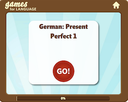
German Language Game: der + adjective + Noun
German Language Game: Practice: "der + adjective + Noun".
You'll use (and guess) 8 common masculine nouns and 8 adjectives in various combinations.
It will help you become familiar with a common German language pattern.
The key is to always say the German OUT LOUD!
Tips for guessing noun gender in German: Masculine
Male people and male animals; days, months, seasons; north, south, west, east.
Examples:
- der Mann - the man
- der Kater - the male cat
- der Montag - the Monday
- der Januar - the January
- der Frühling - the spring
- der Norden- the north
Nouns ending in: -ant, -ig, -ling, -us
Examples:
- der Praktikant - the intern
- der König - the king
- der Neuling - the novice
- der Sozialismus - the socialism
But that leaves a lot of other nouns that you just have to get familiar with.
Der + adj + masculine Nouns in German Game
- der junge Mann - the young man
- der nächste Tag - the next day
- der nette Besuch - the nice visit
- der kleine Schlüssel - the small key
- der gute Roman - the good novel
- der große Platz - the big square
- der schöne Garten - the beautiful garden
- der alte Freund - the old friend
If you like our games, please SHARE us with your friends.
More Than a German Language Game
Don't forget: You can practice German online for FREE with our 36-Scene German 1 Story: "Michael in Deutschland" and our 72-Scene German 2 Mystery Story Sequel: "Blüten in Berlin?".
(If you already know that "Blüten" means blossom in German - you'll learn that Blüten has still another meaning...).
Just login HERE.
And, if you have any language questions - don't hesitate to contact us!

German Language Game: Present Perfect 1
German Language Game: Present Perfect Tense.
Learn and practice the basics of the German Present Perfect Tense, which is also called the "Conversational Past."
This tense is commonly used in casual conversations when talking about the past.
In English, on the other hand, you would often use the simple past for the same situations.
The German Present Perfect Tense uses the auxiliary verbs "haben" and "sein".
In this short interactive game, you'll learn to conjugate and use "haben" with 4 common verbs.
Here's "haben":
- ich habe - I have
- du hast - you have (fam.)
- er, sie, es hat - he, she, it has
- wir haben - we have
- ihr habt - you-all have
- sie/Sie haben - they/you (form.) have
You'll combine "haben" with the 4 following verbs:
- sagen - to say, tell
- kaufen - to buy
- lesen - to read
- lernen - to learn
A sample conjugation:
- ich habe gesagt - I said
- du hast gesagt - you said
- er, sie, es hat gesagt - he, she, it said
- wir haben gesagt - we said
- ihr habt gesagt - you-all said
- sie/Sie haben gesagt - they/you (form.) said
German, does have a Simple Past Tense.
The Simple Past is generally used to narrate past events, and thus is often called the "Narrative Past." In addition, the Simple Past is used in written German.

German Language Game: Irreg. Present e - i
Quick German Language game: 5 Irregular Verbs.
With this quick online game, you can review and practice German verbs, where the stem vowel changes from "e" to "i" in the Present Tense.
- geben - to give
- treffen - to meet
- nehmen - take
- sprechen - to speak
- werden - to become get
Seeing the German words used in the context of a sentence will help you remember them better.
Say the words and phrases ALOUD.
By practicing the German sounds and imitating the native speaker you'll improve your pronunciation.
If you like our games, please SHARE us with your friends.
More Than a German Language Game
And don't forget: You can practice German online for FREE with our 36-Scene German 1 Story: "Michael in Deutschland" and our 72-Scene German 2 Mystery Story Sequel: "Blüten in Berlin?".
(If you already know that "Blüten" means blossom in German - you'll learn that Blüten has still another meaning...).
Just login HERE.
If you have any language questions - don't hesitate to contact us!

German Language Game: anrufen - to call
German Language Game: "anrufen" and "zurückrufen".
With this fun interactive German game, you'll learn and practice how "separable prefix verbs" work:
- anrufen - to call
- zurückrufen - to call back
Simple Present:
- Er ruft Claudia an. - He calls Claudia.
- Du rufst zurück. - You call back. (familiar)
- Sie ruft dich an. - She calls/She'll call you. (familiar)
IMPERATIVE:
- Ruf mich an! - Call me! (familiar)
- Rufen Sie mich zurück! - Call me back! (formal)
With Modal:
- Wir können unsere Freunde anrufen. - We can call our friends.
- Er will seinen Vater zurückrufen. - He wants to call his father back.
Future:
- Ich werde dich später anrufen. - I'll call you(fam.) later.
- Ich werde sie gleich zurückrufen. - I'll call her back right away.
Present Perfect (Conversational Past):
- Wer hat angerufen? - Who called?
- Deine Schwester hat angerufen. - Your(fam.) sister called.
To practice your German comprehension, listen to this conversation, which occurs when our traveler Michael calls the number of his friend's apartment.
More Than a German Language Game
Don't forget: You can practice German online for FREE with our 36-Scene German 1 Story: "Michael in Deutschland" and our 72-Scene German 2 Mystery Story Sequel: "Blüten in Berlin?".
(If you already know that "Blüten" means blossom in German - you'll learn that Blüten has still another meaning...).
Just login HERE.
And, if you have any language questions - don't hesitate to contact us!

German Language Game: Practice: er, ihm, ihn
Quick German Language Game: "er, ihm, ihn".
Test your knowledge of the German pronouns - er ihm ihn - with this quick and fun interactive "Word Invader" Game.
If you like our games, please SHARE us with your friends.
More Than a German Language Game
And don't forget: You can practice German online for FREE with our 36-Scene German 1 Story: "Michael in Deutschland" and our 72-Scene German 2 Mystery Story Sequel: "Blüten in Berlin?".
(If you already know that "Blüten" means blossom in German - you'll learn that Blüten has still another meaning...).
Just login HERE.
If you have any language questions - don't hesitate to contact us!
